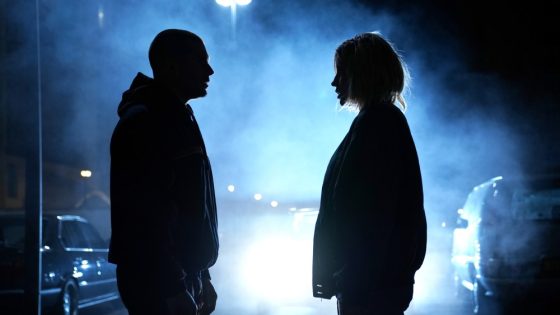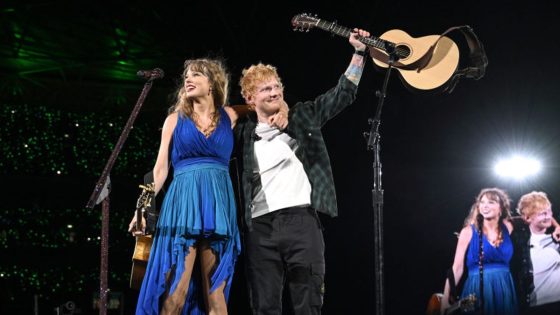Love, as everyone has long agreed, makes you do crazy things. Silly things, too, and vastly indulgent things, and occasionally even beautiful ones. Gilles Lellouche does all of these, in significant quantities, in his supersized gangster melodrama “Beating Hearts,” which takes the slender plot of innumerable B-movies of the past — as time and crime collaborate to derail the pure-hearted romance between two pretty young things — and blows it up to a dizzily grand scale, complete with widescreen camera gymnastics, daydreamy reality breaks and sporadic swirls of Old Hollywood musical choreography. It’s a mad indulgence, but also one fully attuned to the mindset of its two besotted lead characters: When you fall completely in love for the first (and maybe last) time, doesn’t your life become its own Technicolor epic?
That air of big-swinging, love-drunk bravado will buy Lellouche’s film a lot of goodwill from audiences — particularly those at home in France, where, notwithstanding its Cannes Competition selection, it’ll play as a starry commercial enterprise rather than an arthouse item. But it can’t entirely justify a gargantuan 165-minute running time, which is somewhat disproportionately split between multiple decades, and strangely backloaded in terms of drama. Still, “Beating Hearts” never bores, least of all when François Civil and the ever-electric Adèle Exarchopoulos take over as the young lovers’ adult (but far from grown-up) incarnations, while the consistent, cartwheeling kineticism with which Lellouche and DP Laurent Tangy shoot the whole thing is an ongoing rush. For its A-list actor-turned-helmer — staying completely behind the camera in his second solo directorial effort — this represents a gigantic step up from 2018’s sitcom-like hit “Sink or Swim.”
Adapted from Irish author Neville Thompson’s 2000 novel “Jackie Loves Johnser OK?,” with the action relocated from working-class Dublin to an unspecified coastal factory town in France, the film appears to begin at the end. In a stomping, tensely cut opening sequence, young but prematurely jaded gang leader Clotaire (Civil) leads his troupe of thugs into a face-off with a rival crew that becomes a grisly shootout, seen only in glaring flashes of machine-gunfire from an abandoned vehicle, and culminating in Clotaire being shot in the head.
Rewind 20 years or so to the 1970s, where the preteen Clotaire is already an untameable tearaway, treated roughly by his hard-up dock-worker dad (Karim Leklou) and constantly tussling with his devoted younger brother Kiki. By the mid-1980s, 17-year-old Clotaire (now played by Malik Frikah, a wily, jittery revelation) has turned into much the swaggering hellion you might expect, complete with motorbike, buzzcut and bad attitude — but with a boyish twinkle to his delinquency that’s rather beguiling. At least, it is to middle-class 15-year-old Jackie (Mallory Wanecque, channelling the young Juliette Lewis), new at school after being kicked out of a private Catholic academy for insubordination. That detail aside, she’s essentially a good girl, smart and conscientious and devoted to her doting single dad (Alain Chabat) — who grimly sees the writing on the wall when she begins dating this antsy rebel.
Lellouche spends rather too long on the pair’s first flush of puppy-love, giving us one glowingly shot montage after another of starry-eyed scene fragments — dewy lovemaking on the beach, a perfect kiss in a sprawling, canary-colored canola field — that rather overstress a point already made by a single more arresting fantasy setpiece. To the heartsore strains of “A Forest” by Jackie’s favorite band The Cure, the two lovers break into an elaborately choreographed pop ballet through the suddenly depopulated grounds of the school, their bodies darting and twirling and nearly merging in midnight-blue silhouette. It’s not the last time “Beating Hearts” will flirt with the language of the full-scale movie musical — minus any directly performed songs — without entirely going there, and the film, otherwise so gung-ho in its risk-taking, would have benefited from committing wholeheartedly to the conceit.
Things get less interesting, albeit still quite compelling, when Lellouche reverts to straight-ahead genre storytelling. Clotaire drops out of school, falls predictably into the clutches of ruthless local gang boss Le Brosse (Benoît Poelvoorde), and winds up taking the fall when an innocent man is killed by Le Brosse’s slimy son Tony (Anthony Bajon, making the most of a minor role) during a botched heist — cuing a 12-year stint behind bars. Emerging from prison in the considerably more buff form of Civil, he returns home carrying an assortment of scores to settle, and a still-burning torch for Jackie (Exarchopoulos), now in a passionless marriage to white-collar yuppie Jeffrey (Vincent Lacoste), and still not over her first, all-consuming love.
You can guess more or less how things proceed from there, as the film marches toward its seemingly previewed unhappy ending — until a spirit of heightened, infatuated reverie returns, wresting the tonal reins from a cliché-reliant crime drama, and introducing other possibilities. It’s a welcome gear-change, carried by the palpable across-the-years chemistry between its adult leads, even as they’re kept separate on screen for as long as possible.
Exarchopoulos is an intensely grounding presence in an act that could otherwise float off into pure fancy. Handed the pithiest, most emotionally exposed dialogue in the script by Lellouche, Ahmed Hamidi and “Happening” director Audrey Diwan, she brings the viewer fully into Jackie’s pit of arrested adolescent despair as she weeps to a mixtape recording of Prince’s “Nothing Compares 2 U.” It’s another scene where you wish that “Beating Hearts” — already so disarming in its heart-on-sleeve surrender to feeling, and so brazenly unconcerned with being composed or cool — would take that complete leap into the void, and let the lady sing. But we swell up and well up with it anyway, just as we improbably did earlier, at the deeply kitsch and frankly repulsive image of a used blob of pink chewing gum, taken by a truly down-bad Jackie from her beloved’s mouth, starting to pulse and throb like, well, a beating heart. It shouldn’t work, but it does. Love makes you do crazy things.
Source Agencies



